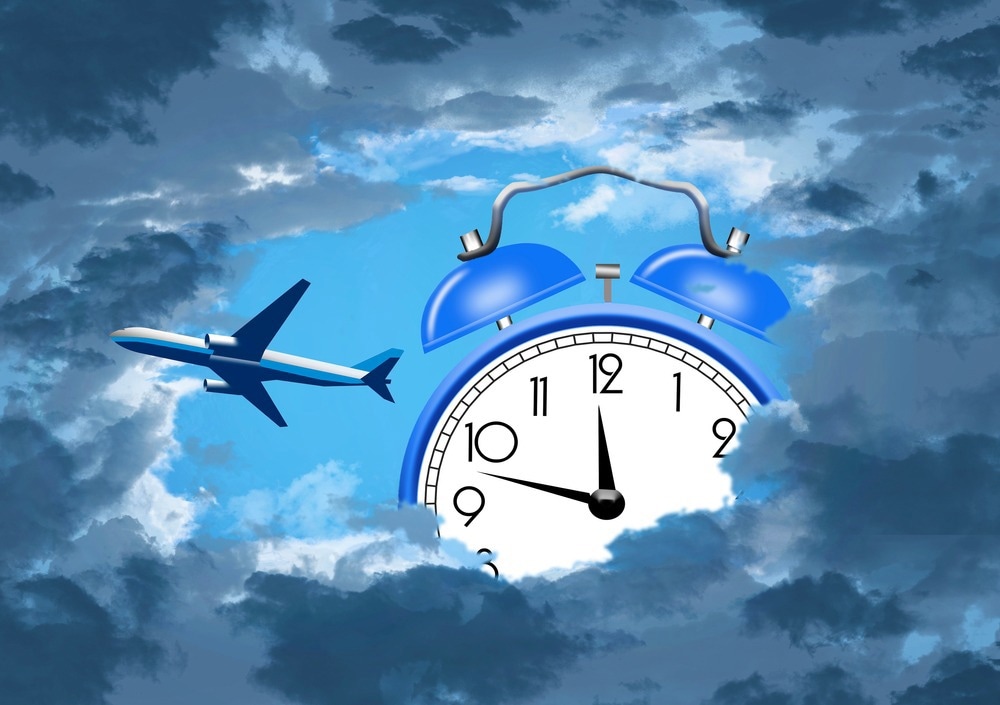Introduction
Basis of Jet Lag
Getting Over Jet Lag
References
Jet lag is a temporary sleep disorder caused by misalignment of the body’s circadian rhythm with the time zone the traveler is in. The circadian rhythm determines the diurnal patterns of various bodily processes, such as digestion, mood, energy and hormonal and nervous stimulation.

Image Credit: robertindiana/Shutterstock.com
Basis of Jet Lag
Jet lag occurs among air travelers who quickly cross multiple time zones. The traveler’s body clock is slow to adapt to the time of arrival once the destination is reached. This results in disruption of the circadian rhythm and the body’s sleep and wakefulness pattern, which is now desynchronized with the new environment.
Circadian rhythms are set in response to the light-dark cycles of the ‘home’ time zone, where the traveler started out from. They are dependent upon the secretion of melatonin, from the pineal gland in the brain. This secretion of melatonin is regulated by the region of the brain called the suprachiasmatic nucleus of the hypothalamus.
What does melatonin do? It prepares the body for the onset of darkness, and thus for winding down, rest and sleep. During sleep, at about 3.5 to 4 hours before waking, the body temperature drops to its lowest. The body is most sluggish at this time. During jet lag, the time of sleeping no longer correlates with the melatonin secretion pattern. The minimum temperature may occur after waking.
Jet lag can cause difficulty sleeping at night, daytime sleepiness, indigestion, disrupted bowel function, general malaise and reduced mental and physical performance. The symptoms of jet lag gradually wear off as the body starts to adapt to the new time zone.
Getting Over Jet Lag
It is not possible to prevent jet lag but people can take measures to reduce the negative effects of it. Examples of meaures that can be used to minimize jet lag are described below:
- People should ensure that they are as well rested as possible before their flight departs and take any opportunity to rest during a medium or long-haul journey.
- Alcohol consumption should be limited as it increases urine output, which may lead to an increased urge to urinate and therefore disrupted sleep. Although alcohol may bring forward sleep onset, the sleep is less restful because alcohol disrupts quality of sleep. Consuming excessive amounts of alcohol can lead to a hangover, which worsens the effects of jet lag.
- Caffeine consumption should be limited and avoided altogether within at least 4 hours of an expected sleeping period. If coffee is drunk during the day, it is better to drink small amounts every two hours than it is to drink one large cup.

Image Credit: PONG HANDSOME/Shutterstock.com
- On arrival at their destination, people should try to create comfortable sleeping conditions and try to get as much sleep as possible within the first 24 hours of arrival. A minimum of 4 hours sleep during the night is thought to be how much is required in order for the body’s internal clock to adjust to a new time zone and this is referred to as “anchor sleep.” If possible, naps should be taken throughout the day to make up the total sleep time. The use of earplugs or eye shades may help with this.
-
One of the most important factors in resetting the body’s internal clock is the cycle of light and dark. A well-timed exposure to natural sunlight, preferably bright sunlight, is the best way to synchronize the body clock and aid adaptation. Alternatively, light boxes can be used intermittently to expose the person to artificial bright light, which stimulates the resetting of the circadian rhythm over a period of time. Light boxes may be used in the time before bedtime. Large light boxes give greater ease of use, as the beam is wider and the range of movement less restricted. Small light boxes can be taken to work, to save time. Cool white light has the same effect as blue fluorescent light, in the degree of shift they produce. At the same time, the use of sunglasses in the morning after waking up, or an eye mask, or, ideally, a dark bedroom, are needed to maintain and establish this shift by preventing light exposure early in the morning.
-
Melatonin supplements are available in some countries, but these supplements are not subjected to the same strict regulation as medications. It has not yet been fully evaluated how much or how often melatonin should be taken and the side effects are not known, especially the long-term side effects. Furthermore, there are no standardized manufacturing methods, with the dose in tablets varying between different producers. The use of melatonin is therefore not recommended as a treatment for jet lag.
-
Before travelling Westwards, the body clock can be reset by making sleep periods 1 or 2 hours later for a few days prior to travelling. Before travelling Eastwards, sleep can be changed to 1 or 2 hours earlier. Shifting mealtimes to coincide with these changes may also be helpful.
-
Trying to adjust the body clock to the new time zone may not be worthwhile for short trips of 2 to 3 days because the body clock may not have time to synchronize and re-synchronizing it again once back home may prove more difficult.
References:
-
Choy M, Salbu RL. Jet lag: current and potential therapies. P T. 2011 Apr;36(4):221-31. PMID: 21572778; PMCID: PMC3086113.
-
Eastman CI, Burgess HJ. How To Travel the World Without Jet lag. Sleep Med Clin. 2009 Jun 1;4(2):241-255. doi: 10.1016/j.jsmc.2009.02.006. PMID: 20204161; PMCID: PMC2829880.
-
Toh, K. (n.d.). Basic Science Review on Circadian Rhythm Biology and Circadian Sleep Disorders. [online] Available at: https://annals.edu.sg/pdf/37VolNo8Aug2008/V37N8p662.pdf [Accessed 25 Jul. 2022].
-
www.who.int. (n.d.). Air travel advice. [online] Available at: https://www.who.int/news-room/questions-and-answers/item/air-travel-advice [Accessed 25 Jul. 2022].
- wwwnc.cdc.gov. (n.d.). Jet Lag - Chapter 8 - 2020 Yellow Book | Travelers’ Health | CDC. [online] Available at: https://wwwnc.cdc.gov/travel/yellowbook/2020/travel-by-air-land-sea/jet-lag.
Further Reading
Last Updated: Sep 11, 2023